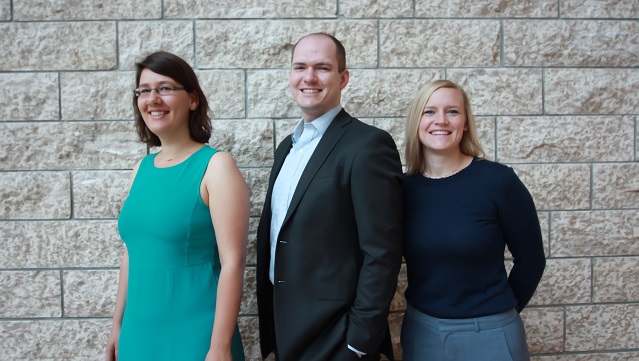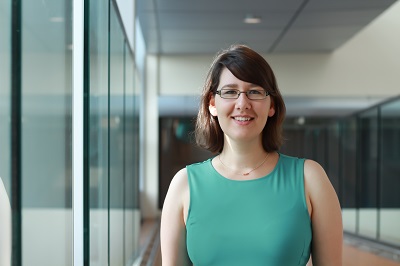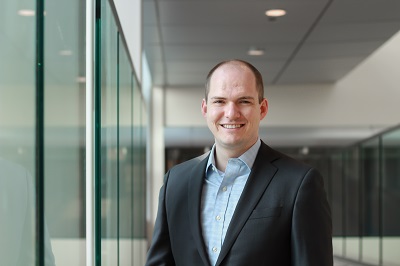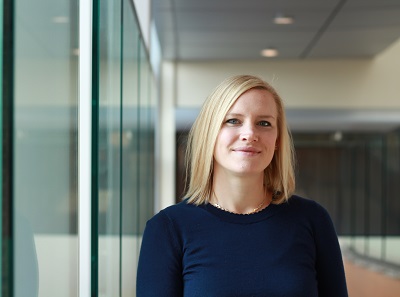
Elisabeth Richardson, Michael Laffin and Megan Beggs, 2017 Vanier Canada Graduate Scholarship recipients.
From guts to bones to specialized cells, PhD students in the Faculty of Medicine & Dentistry are solving health mysteries, bolstered by Vanier Canada Graduate Scholarships, a prestigious national award that attracts and supports leading graduate research over a three-year term. Elisabeth Richardson, Michael Laffin and Megan Beggs are the recipients of this year's prestigious honour, following the success of Christen Klinger, the FoMD's recipient of the 2016 scholarship.
"These highly competitive awards recognize students who not only have outstanding academic records but also have a demonstrated capacity for leadership," said Hanne Ostergaard, the faculty's Associate Dean of Research and Graduate Programs. "Canada is making a substantial investment in these individuals because they will likely be future leaders in their chosen careers." Ostergaard says that having multiple winners from the Faculty of Medicine & Dentistry in the past two years reflects the quality of research that graduate students are producing here.
Elisabeth Richardson, Department of Cell Biology
Vanier Granting Agency: NSERC
Project Title: Assessing eukaryotic microbial diversity and ciliate membrane trafficking adaptations in a tailings pond undergoing reclamation in northern Alberta, Canada
Supervisor: Joel Dacks, Canada Research Chair in Evolutionary Cell Biology

Originally from Oxfordshire, England, Richardson did not expect her research to lead her to Canada.
Richardson says that Canada has some of the best protistology labs in the world, and she could not be happier to work here at University of Alberta with her supervisor Joel Dacks.
"I've always been interested in protists (single-celled organisms)," Richardson said. "My undergraduate thesis project sparked my interest in single-celled eukaryotes, so I undertook a master's degree supervised by professor Mark Carrington. When I became interested in protists and genomics, my undergraduate thesis project supervisor Richard Dorrell-an algal evolution specialist at the University of Cambridge-connected me to Joel Dacks' comparative genomics lab. That happened in January 2014, and I was here by July, so it was a quick decision."
Richardson is investigating the use of naturally occurring microbes called ciliates for use in oil sands reclamation.
"These microorganisms are present in the natural environment in Alberta, and ciliates are really good eco toxicity indicators," she said. "By looking at the diversity of ciliates in the environment, it's helpful for figuring out the overall health of the ecosystem. We're hoping that the work we're doing will be informative for reclamation, and to help maintain the natural environment."
The Vanier scholarship is a win for the entire team, according to Richardson. "When you don't have scholarships you're being paid with your supervisor's operating grants, so it means that as a lab we have more resources." This year the team will represent the University of Alberta internationally at the International Congress of Protistology in Prague, where seven lab members will present, including a keynote address from Joel Dacks.
Michael Laffin, Department of Surgery/ Centre of Excellence for Gastrointestinal Inflammation and Immunity Research (CEGIIR)
Vanier Granting Agency: CIHR
Project Title: The genetics, microbiology, and immunology of post-operative Crohn's disease
Supervisors: Karen Madsen, Bryan Dicken, Eytan Wine and Richard Fedorak

General surgery resident and PhD candidate Michael Laffin believes that the secret to better health outcomes for his patients lies in the gut.
"Ever since I was in medical school I knew I wanted to come to the U of A for general surgery residency, because it has great clinical training, but it also provides this opportunity to do basic science research," said Laffin. "There's so much interesting pathology and so many bacterial influences and neurotransmitters. So much is derived from our gut."
Laffin is researching Crohn's disease after surgery and factors that influence the disease coming back. "Once you take out a segment of the disease and sew it back together, the disease comes back about 80 per cent of the time, so I'm looking at the microbiology, genetics, and immunology to find out why that happens."
For Crohn's patients, surgical treatment is the last option and 50 per cent of Crohn's patients will require surgery at some point in their life. Canada and specifically Alberta have some of the highest rates of Crohn's disease in the world, so Laffin hopes his research will help many people.
"My project is great because it really is translational. We're bringing research from the bench and bringing it to the bedside. I like to think that I have an advantage for clinical research because of my clinical background. I can see what happens on the clinical side and bring that experience back to the lab, and bridge those two things together."
The Vanier scholarship allows Laffin to take a step back from his demanding general surgery residency in order to focus solely on research. "I do miss the clinical side of things because that's what this is all about-taking care of patients and getting people better."
Megan Beggs, Department of Physiology
Vanier Granting Agency: NSERC
Project Title: Molecular mechanisms mediating a positive calcium balance during development
Supervisor: R. Todd Alexander, Canada Research Chair in Renal Epithelial Transport Physiology

Megan Beggs is addressing the disparity between children and adults in health research.
"People have known for a long time that children are not just little adults," she said. "There is a huge need for more pediatric research, especially when it comes to things like calcium balance and bone health. Our bones are built by the time we're young adults, and then that's it. There's a gap in our knowledge in that we know this is the important time period, but we don't know anything about how it happens."
Beggs works as a pediatric dietitian, where she first noticed a link between nutrition and bone development. "We often see cohorts of children who have poor bone prognosis, including children born prematurely or with congenital heart disease, but there is little medical knowledge of why this happens."
"When I first started working with Dr. Alexander he asked me, 'You're a dietitian, why do these children have poor bones? What's wrong with their calcium balance?' And I said I don't know. So we looked at the literature and found out that actually nobody knows."
Most research done on how the intestines and kidneys absorb calcium comes from adult studies, Beggs says. "So the first thing I did was to look at all the genes associated with the pathways of absorption, and how that would differ at different ages. We found pathways that exist only in the neonatal period, so that's really exciting. Now we're trying to figure out what causes these changes over time."
Beggs feels fortunate to be externally funded because it means there's extra money to do the research, or to fund other students.
"I think that this scholarship is great for me personally, but it wouldn't happen without great supervisor support to develop my ideas," she adds. "The U of A community in general is so collaborative and supportive. Even people who aren't involved in my research are willing to make suggestions and make it a more far-reaching project. So, this isn't just a win for me, it reflects on my supervisor and the U of A as a whole."
The next steps: Past recipient builds upon a year of scholarship
Christen Klinger, Department of Cell Biology
Vanier Granting Agency: CIHR
Project Title: Bioinformatic, transcriptomic, and functional characterization of novel membrane trafficking genes in apicomplexan parasites and elucidation of their potential role in host cell invasion
Supervisor: Joel Dacks, Canada Research Chair in Evolutionary Cell Biology

Christen Klinger, 2016 Vanier scholarship recipient, sees the difference a year can make.
"My perspective when I first went in was that it's a great honour, but it's a little bit of pressure too. People have entrusted you with these resources so you want to make sure you produce something tangible. But I can honestly say that after a year, I've managed to do a lot of work and we'll be able to produce some really good research."
Klinger's research goal is to understand the structures and functions of malaria and other prominent parasites, through classifying and tagging specific genetic components of the cells (called membrane trafficking systems), and later studying groups with shared characteristics.
"This entire group of parasitic organisms shared a common ancestor with completely harmless photosynthetic, free living algae, so we want to understand how you go from something floating around the ocean making your own food, to something that infects people and animals and causes significant losses of life on a global scale," said Klinger.
The goal of his work is to understand more about the specific biology of the organisms. "We're not looking at developing therapeutics, but what we can do is aid others in understanding what to look for in therapeutic intervention. And more generally, understanding how these parasites work might help our understanding of other parasites, which could be a kickstart for other research."
Klinger has just returned from a year at the University of Glasgow, where he is working with international collaborators.
"The number one reason that I'm extremely grateful to have been awarded the scholarship is that it has enabled me to work internationally," he said. "Specifically in terms of the amount of resources required to live in another country for an extended period of time, the Vanier has really allowed that to happen and has allowed me to do more than just the first stage of the project. Being able to do both parts of the project is extremely important to me."